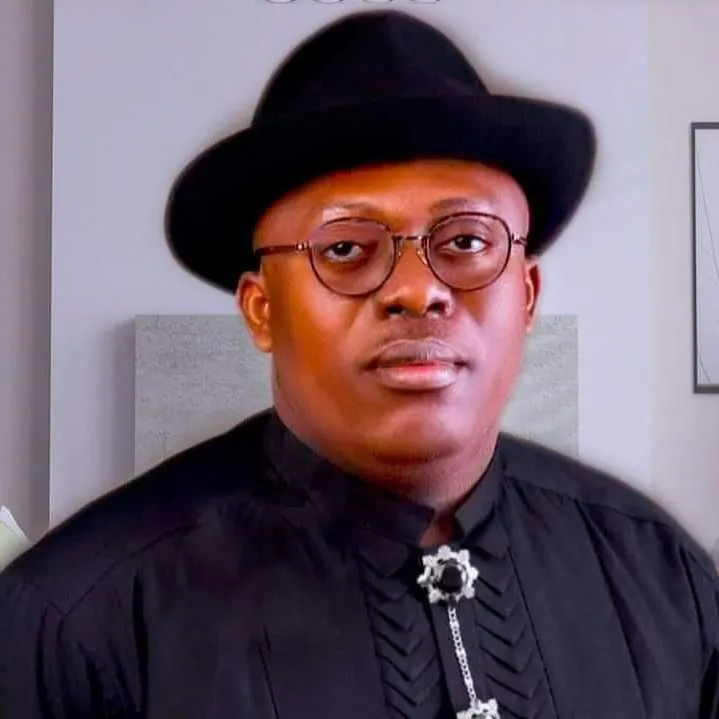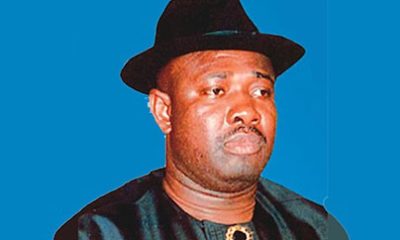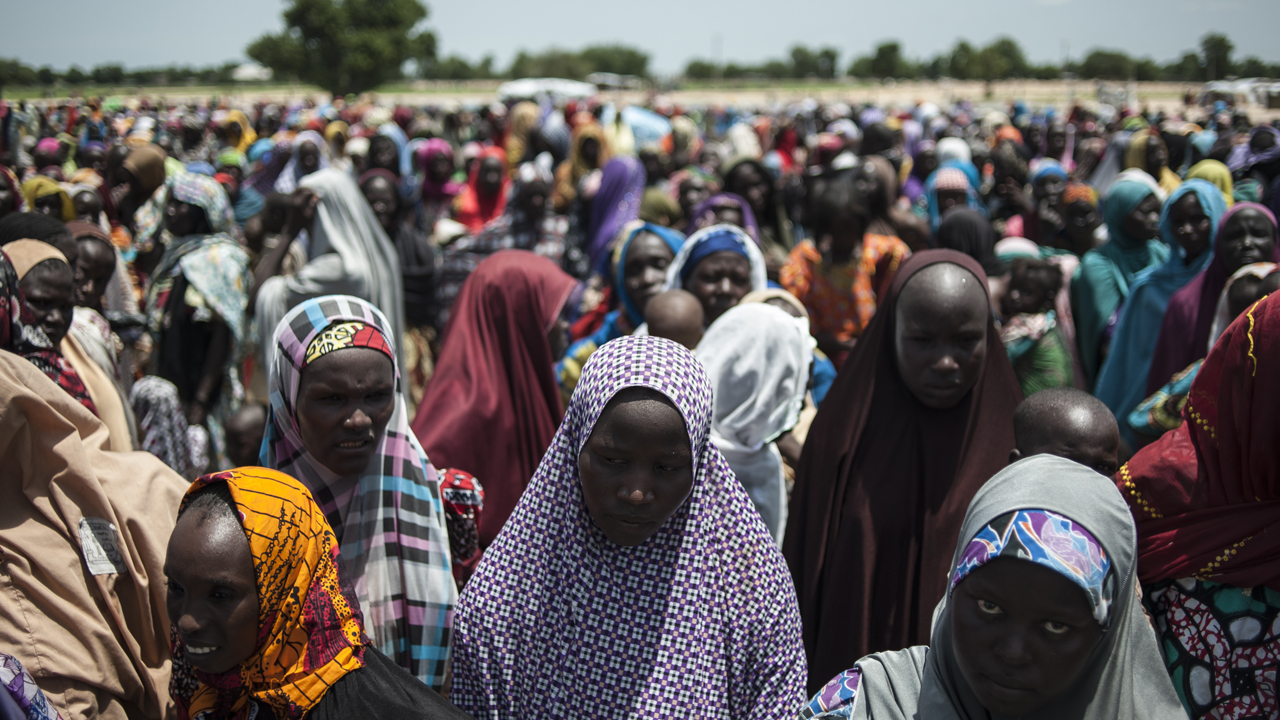OPINION
Rivers Crisis: How Fubara Can Resolve Stalemate without Firing Shot

By Ehichioya Ezomon
Rivers State Governor Siminalayi Fubara’s made the world to believe that his predecessor and Minister of the Federal Capital Territory (FCT), Abuja, Chief Nyesom Wike, is the architect and purveyor of the political crisis in the state. He’s used every opportune moment to drum this narrative for the consumption of a sympathetic public.
Fubara struck a similar cord lately, at the heat of the contentious and bloody October 5, 2024, local government council election that’s resisted and boycotted by the Wike faction of the ruling Peoples Democratic Party (PDP), and the opposition All Progressives Congress (APC) in the state.
Appearing on a Channels Television’s ‘Politics Today’ on Monday, October 7, Fubara advised Wike to let go of his grip on the Rivers polity, “for the sake of the good people of Rivers State, and the love that you (Wike) have always professed for the state.
”On the alleged breach of a “gentleman’s agreement” he’d entered into with Wike to secure his “anointing and endorsement” as the PDP candidate for the March 18, 2023, governorship, Fubara said he’d kept all “understanding” with Wike, and lounged into his talking point of how he’d repeatedly knelt down for Wike for peace to reign in Rivers.
“There is nothing I have not done on this earth for peace to reign. I can tell you the number of times I have knelt to beg (Wike) that, let’s allow this issue to go. I have done everything,” Fubara said, even as continuously states, “I will not worship any human being but God” – indicating alleged Wike’s demand he (Fubara) should worship him, a charge Wike’s denied.
Fubara says he appreciates the fact that Wike played a pivotal role in his governorship, but that it’s God that used Wike as a vessel to fulfil His purpose, and so, only God deserves his (Fubara’s) worship, and not any human. He echoed this sentiment on May 16, 2024, during the inauguration of Egbeda internal roads, in Emohua local government area of Rivers.
Fubara said: “God can do anything He wants to do when He wants to do it. It is only for us to realise that God will not come down from Heaven but will pass through one man or woman to achieve His purpose. So, for that reason, when we act, we act as humans; human vessels that God has used, and not seeing yourself as God.
“I want to say this clearly, that we appreciate the role our leaders, most especially the immediate past governor (Wike) played. But that is not enough for me to worship a human being. I can’t do that.”
However, on May 11, 2024, in Ogu-Bolo, Rivers State, at a grand reception in honour of Chief George Thompson Sekibo for his 20 years of public service, Wike said he isn’t God, and as such, had never demanded that anybody should worship him. “Nobody can worship man. All of us believe that it is only God we will worship. (But) as politicians, we appreciate people who have helped us,” Wike said.
Asked on the Channels TV’s programme what his message to Wike would be if they met, Fubara said: “I’ll tell him that it has gotten to a point where he needs to let go. We need peace in this state. You don’t necessarily need to win all the fights; at times, you just let go for the sake of the good people of Rivers State and the love that you have always professed for the state.”
Noting that “election periods are over and it’s time for governance,” Fubara urged Wike to give peace a chance. “What I am appealing is: Everyone should sheathe their swords. Even to the Minister, my oga (my boss), there is no need to destroy this state. When it comes to the election period, you can fight and do whatever but now is the time for governance. We need all the support,” Fubara said.
“He (Wike) once ruled this state and the state was an envy of every other state. Another person (Fubara) is there now, (and) what we need is the support. After four years or eight years, who knows? I will also leave and someone else will take over. That should be the spirit. Fubara will leave tomorrow. Who knows who is going to come? It might be through him or another person but we need to secure the state.”
But does Fubara really desire peace in Rivers State? It doesn’t seem so! Otherwise, he should quit the baiting, the insulting, the denigrating, the rhetoric, and the labelling of Wike as “the enemy of Rivers State” – all done by Fubara to curry sympathy and secure the approval of the gaming public. You can’t be talking peace and at the same time be fanning the embers of war!
Fubara can stoop to conquer by embracing genuine reconciliation with Wike. For instance, what stops the governor from telling those beating the drums of war for him that, “Enough is enough, I’m going to make peace with Wike for the sake of Rivers State and its people?”
This may not work due to the personal and partisan differences among the former governors and the incumbent. For example, Odili aligns with Fubara and alienates Amaechi and Wike; Amaechi’s sours on Odili, Wike and Fubara; Wike’s beef with Odili, Amaechi and Fubara; and Fubara and Wike are on a war path.
In such a scenario, who’ll call for the “sit-at-table” peace meeting? President Bola Tinubu would’ve fitted the bill, but he literally burnt his fingers the last time he attempted a truce between Fubara and Wike. The agreement, witnessed and signed by Odili, Fubara and Wike, among others, collapsed almost immediately it’s hashed out, with Fubara, who initially said the agreement “wasn’t a death sentence,” turning round to lebel it as political and not constitutional.
So, here’s a simple approach that’ll not only put Wike on his back foot, and induce him to return to the basic, but also push him to his wit’s end! Fubara should select some of the elders and leaders of the divide in Rivers, including the former governors, and inform Wike that he’s coming with a delegation on an agreed date, to fully reconcile with him. The ball will then be centrally placed in Wike’s court to either accept or refuse Fubara’s expressed desire for armistice between them.
Fubara’s offer of peace should be widely publicised in the media – different from his claimed behind-the-scences kneeling down to beg Wike – for maximum pressure and effect on Wike, and it’ll be well and good if the overture comes through! If doesn’t – in the event that Wike declines the invitation to reconcile, his current and intended political antics will be exposed as being the real masquerade behind the political turmoil in Rivers State, and Fubara will be vindicated at last.
All told, the “feat” Fubara achieved with the conduct of the local government council election hasn’t guaranteed a win over the war with Wike. Instead, he’s merely won the battle – a pyrrhic victory of some sorts – while the war remains. It’s still a dicey situation in which “a child doesn’t know when sleep takes food from their mouth” – depicting the futility of the “clever person” attempting to hold on to something that’s slipping away from them.
Fubara strives strenuously to exonerate himself from the crisis he’s helped engineer and sustain for a year now. That Rivers is going through the grinding mill is because of the governor’s failure to use tact and diplomacy in handling and dealing with Wike’s alleged overbearing influence on his government.
Agreed that Wike – amid strong opposition and resistance from even political leaders from Fubara’s homestead – worked on the recommendation of some Rivers leaders, and took Fubara from the civil service to the Government House, for which Fubara should be grateful, and accord Wike the respect he deserves within the ambit of personal relationship and official conduct.
Reciprocally, Wike should give Fubara the space to freely run his government, and not breath down his neck, as doing so portrays him as a “godfather” that exerts maximum loyalty from and punishment on their surrogates. That’s what Wike’s become, and as especially sold by Fubara to the public, which views the governor as the underdog, and backs his duel with Wike in the supremacy contest to control the political structure, power and resources of Rivers State.
But in his quest to crush and humiliate Wike over his appetite for “godfatherism,” Fubara’s committed numerous unforced errors, as he listens and tries to satisfy his supporters, who pressure him to man up and “show Wike that you’re the Governor of Rivers State.” It’s time Fubara ditched their selfish advice, and chart a different course that’ll genuinely ensure peace and security in Rivers!
Ezomon, Journalist and Media Consultant, writes from Lagos, Nigeria.
OPINION
This Trial of Oloyede
By Tunde Akanni
It’s been traumatic for my entire family since that video started making the rounds. I sneaked a slight view… It’s our trial. It’s my trial. Oloyede is genuine. He is most sincere. He is modestly so, as well. For us, however, Allah knows best.
I was with a trader in the afternoon of what I considered a dark Wednesday, the 14th of May. “Se bi won ni JAMB o get mo bayi…”. I had to cut in immediately. Which JAMB? “Madam, that’s one person I will vouch, and vouch for…zero tolerance for corruption. Absolutely responsible with a high level of consciousness for the good of others. If certain things went wrong at JAMB, I agree it’s his responsibility to carry all pleasant and other burdens but just know that the bad side of the operations may as well be sabotage. I have absolute trust in that man. Ask my own colleagues about me, but Oloyede is my own hero, somebody I have known for more than 40 years…”This is by no means a reductionist disposition to the tragedy induced by the so-called computer glitch. May the Almighty God in His infinite mercy console the parents of the candidate reported to have committed suicide. May God strengthen them to survive this gloomy phase of their lives and sustain them to reap bountiful compensation that will endure in their lives. It’s hard, so hard to pull tragedies of this magnitude. I personally feel for these parents.The said computer glitch, may we never fall victim to it. Those who work for big organisations requiring a large layout of ICT operations know what I’m talking about. Rather than being ‘solutional’, IT facilities can be unimaginably problematic sometimes, yet indispensable in this civilisational dispensation. This is not doubting deliberate sabotage, as may have happened in the case of JAMB. I’ve been part of Oloyede’s JAMB journey to attest to his commitment to offer his best for the otherwise sinking board.Far from being cosmetically exhibitionist, the Oloyede-led JAMB team, led by the Education minister, Tunji Alausa, went round the critical facilities of JAMB during the just concluded examination. Alausa saw, firsthand, like never before elsewhere in this country, how far JAMB had gone in its strive for transparency and the real-time monitoring of the conduct of examinations nationwide. Alausa, beyond being in awe, sought to make the JAMB effect spread immediately to other examination bodies.No be dem say, same day, the WAEC team came to JAMB and made it into the situation room, which was my own duty post. The NECO team followed suit afterwards, both duly led around by the sturdy lead IT consultant who’s been reliably there from Oloyede’s assumption of duty, Damilola Bamiro. Far richer, given that they charge more for their exams, the duo of WAEC and NECO were suddenly mandated to understudy the examination sector leader in Africa that JAMB has become over time.The staff of both WAEC and NECO suddenly had to undertake a professional excursion led through all the real time monitoring screens and other digital facilities. It was obvious they marvelled at what they saw, revealing a functional leader-subordinate synergy manifest with trendy output that the world can see and learn from.But that may even seem like the tip of the iceberg of the output of the hard work and commitment of the nation’s foremost icon of integrity in public service. A series of far more seemingly serious strides had been accomplished by Oloyede at JAMB. As a focused scholar, he keeps ensuring that every bit of the experience of the Board is treasured as worthy data to guide future actions and even subjects for further research.Not even the agencies dedicated to emergency matters in Nigeria could have been as prompt as the Oloyede management on this ugly glitch saga. Once the complainants began ventilating into the public space, JAMB rose to the challenge without any predictably traditional arrogant stance of government is always right. I was aware that a particularly strident public critic and a former students’ leader at Obafemi Awolowo University, Adeola Soetan commended the spokesperson for JAMB for the excellent handling of public complaints.Promptly, an independent team of investigators was set up to unravel the mystery leading to the rather depressing situation that now confronts us. The team, drawn from assorted but technically relevant constituencies, has found out that no fewer than 165 centres of over 800 examination centres nationwide were affected.Obviously well prepared for whatever the outcome may turn out to be, he braced up to the challenge to embrace the surrender value to tell it to the world as it is. This trial is for all of us who believe and trust Oloyede. I am in this group. So much so that his public cry infected me…It was a patriot’s cry for his beloved country. Like me, a former Law don at LASU, Dr Kilani wasn’t any less affected as demonstrated in a quick note to me: “I write to associate myself with the pain, sorrow and emotion of our own Professor Oloyede. I could not hold my tears seeing him cry. May Almighty Allah see him through. May we all not be put to shame…”But then came a soothing message from Gbade Osunsoko, my cousin: “…He will come out of this much stronger because Nigerians will trust him far better than a number of our leaders.. A man that makes mistakes happens under him and takes responsibility – it’s a big deal in Nigeria.”With Oloyede, young Nigerians with challenges regarding sight are no longer left to moan their fate endlessly, with adequate provision for their inclusion in the UTME. How many of our public facilities are this inclusion conscious as stipulated by SDGs? How come a legacy built through almost a decade at the very best cost ever possible will be made to crumble when the game changer leader remains ever modest? JAMB has steadily risen through thick and thin to accomplish its tasks to the admiration of stakeholders, nationally and internationally, under Oloyede. Both NNPC and the Nigeria Police, being beneficiaries, can attest to the current competence of JAMB. How many other numerous stakeholders nationwide never deemed to have any relevance to JAMB before Oloyede but have since become critical, if not indispensable players?But why does this sudden saddening encounter threaten our joy of service without blemish? Why this unforeseen truncation of a good story, so intentional, coming from Africa? Whodunnit? Surely the truth shall come out for the world to perceive and assess and get to appreciate the efforts and the quantum of commitment appropriated to the JAMB excellence project driven by Oloyede.One cannot but be deeply concerned. Before the very eyes of a few of us carefully selected to give support from our respective professional perspectives from the very beginning, Professor Oloyede’s concern for genuine growth and development was real. It is still real and increasingly so, as a matter of fact. Indeed, inimitable. It shall be well.Tunde Akanni is a professor of Journalism and Development Communications at the Lagos State University, LASU. Follow him on X:@AkintundeAkanniOPINION
Democracy, Institutions, and the Rule of Law

By Kator Ifyalem
Democracy, often hailed as the cornerstone of modern governance, is a system that empowers citizens to participate in the decision-making processes that shape their lives. However, the mere existence of elections is not enough to ensure a fair, just, and prosperous society.
Without robust institutions, the rule of law, and ingrained values, democracy can become a hollow shell, susceptible to corruption, manipulation, and eventual collapse. At its core, democracy is built on the principle that power resides with the people. This power is exercised through fair elections, where citizens choose representatives to govern on their behalf. The effectiveness of this system relies heavily on the strength of supporting institutions, adherence to the rule of law, and shared values that guide societal behaviour.Institutions serve as the backbone of a democratic society, translating the will of the people into action. These include governmental bodies such as the legislature, executive, and judiciary, as well as independent organizations like electoral commissions, anti-corruption agencies, and human rights commissions. These institutions provide checks and balances, ensuring that no single entity or individual can accumulate too much power. They create a framework for accountability, transparency, and effective governance.An independent judiciary is crucial for upholding the constitution and protecting individual rights. Without it, laws can be manipulated or ignored by those in power, leading to tyranny. Similarly, a free and independent media acts as a watchdog, informing citizens and holding those in power accountable. When media institutions are weakened or controlled by vested interests, the flow of information is compromised, and citizens are unable to make informed decisions.The rule of law is another critical component of a functioning democracy. It ensures that all citizens, regardless of their status or position, are subject to the same laws and legal processes. This principle is fundamental to creating a fair and just society where everyone’s rights are protected. A robust legal framework, consistently and fairly enforced, provides the predictability and security necessary for social and economic development. It protects property rights, enforces contracts, and creates an environment conducive to investment and growth.Moreover, the rule of law is essential for protecting minority rights and preventing the tyranny of the majority. In a true democracy, the rights of all citizens must be respected, even if they are not part of the ruling majority. This protection is enshrined in laws and enforced through effective legal institutions.Values form the third pillar of an effective democracy. These shared beliefs and principles guide societal behaviour and inform policy-making. Democratic values include respect for human rights, tolerance of diversity, commitment to justice, and belief in the equality of all citizens. When these values are deeply ingrained, they act as a safeguard against authoritarian tendencies and help preserve the integrity of democratic institutions.For instance, a healthy democracy can be likened to a three-legged stool, where institutions, the rule of law, and democratic values form the legs. Just as a stool cannot stand stably without all three legs being strong and balanced, a democracy cannot function effectively if any of these elements is weak or missing. In Nigeria’s case, we’ve seen how weaknesses in one area, such as institutional challenges in election management, can put stress on the other legs, requiring the judiciary (rule of law) and civil society (democratic values) to bear more weight to maintain stability.Education plays a crucial role in instilling these values. A well-informed citizenry, aware of their rights and responsibilities, is better equipped to participate meaningfully in the democratic process. Civic education programs that teach the principles of democracy, the importance of institutions, and the value of the rule of law are essential for creating engaged and responsible citizens.The interplay between institutions, the rule of law, and values creates a self-reinforcing cycle that strengthens democracy. However, this cycle can also work in reverse. Weak institutions often lead to a breakdown in the rule of law, eroding democratic values and further weakening the system. This negative spiral will ultimately lead to the collapse of governance, even if the outward trappings of democracy remain.To prevent this decline, concerted effort is required on multiple fronts. Institutional capacity must be built and maintained through adequate funding, training, and support. The rule of law must be consistently enforced, with mechanisms in place to address corruption and abuse of power. This requires not only strong legal frameworks but also a commitment to their implementation.International cooperation also plays a role in strengthening democracy. Countries learn from each other’s experiences, share best practices, and provide support for development. However, it’s crucial to recognize that democracy cannot be imposed from outside; it must be nurtured from within.True democracy requires more than just the act of voting; it demands a comprehensive system of governance that respects the rights of all citizens, upholds justice, and promotes the common good. Strengthening these fundamental pillars (institutions, the rule of law, and values), is crucial in building more resilient, effective, and truly representative democracies that serve the needs of all citizens and contribute to global stability and prosperity. Where does Nigeria as a nation stand on this scale?OPINION
Reshaping Nigeria’s Student Loans for Inclusive Access

By Tosin Kolade
In June 2023, President Bola Tinubu signed the Student Loan (Access to Higher Education) Act into law, marking an important step forward in the country’s approach to financing tertiary education.The initiative was designed to provide interest-free loans to students in higher institutions, thereby expanding access to education for financially disadvantaged youth.
However, nearly two years on, the scheme’s implementation remains burdened by challenges, prompting growing concern and debate among stakeholders. In response to criticism of the original law, the Federal Government repealed and re-enacted the Act in April 2024.The revised legislation established the Nigerian Education Loan Fund (NELFUND) as a corporate entity responsible for managing and disbursing the loans.Notably, the amended version eliminated restrictive eligibility criteria such as income thresholds and guarantor requirements.It also extended the scheme’s coverage to include students enrolled in government-accredited vocational training centres.To streamline access, the application process was simplified, requiring only a valid National Identification Number (NIN) and Bank Verification Number (BVN).Hence, all submissions were made via the NELFUND portal.In spite of these improvements, the scheme has continued to attract criticism.One of its most vocal opponents is the Academic Staff Union of Universities (ASUU).In a recent interview with a national daily, Dr Mwolwus Jurbe, Chairman of ASUU’s University of Jos chapter, outlined the initiative as “fundamentally flawed”.He argued that the scheme was unlikely to benefit its target groups, especially students from low-income families.“The scheme is pushing education out of the reach of the common man,” he said.Jurbe said that, amid high unemployment rates and soaring tuition fees, expecting repayments from indigent students was unrealistic.ASUU also raised alarms over reports that TETFund allocations might be redirected to fund NELFUND.The body warned that dismantling a functional funding mechanism in favour of an untested alternative could jeopardise the future of tertiary education in Nigeria.Meanwhile, the National Association of Nigerian Students (NANS), while generally supportive, has also expressed reservations.The association acknowledged the potential of the scheme to reduce dropout rates, but emphasised that the absence of scholarships or grants rendered it incomplete.NANS President, Comrade Olushola Ladoja, condemned the alleged mismanagement of NELFUND, calling for the dismissal of implicated officials and the publication of the 51 tertiary institutions reportedly involved.“Any vice-chancellor, rector or provost found culpable in the mismanagement of student loans must be removed from office.“Their actions sabotage the Federal Government’s effort to make education accessible to all,’’ Ladoja said.He urged Tinubu to probe the reported diversion of N71.2 billion and criticised NELFUND for excluding the national student leadership from key stakeholder engagements.Additionally, NANS called on the EFCC and ICPC to investigate the matter and advocated for a five-year post-NYSC loan repayment grace period, citing the employment difficulties faced by many recent graduates.Civil society groups have also raised concerns.The Education Rights Campaign (ERC) described the initiative as “badly thought-out, ill-conceived and fundamentally unworkable”.Hassan Soweto, National Coordinator of the ERC, lamented repeated delays in the loan rollout, calling it evidence of poor planning and political inertia.“It is a national embarrassment that almost a year after the law was signed, students are still waiting for funds,” he said.Worthy on note, trust in the scheme further eroded in August 2024 when it was revealed that no tertiary institution in the South-East had been included in the first phase of disbursements.Reacting, the Concerned Igbo Stakeholders Forum (CISF), led by Chukwuma Okenwa, condemned the omission as a deliberate act of marginalisation.Okenwa argued that excluding an entire geopolitical zone from a national programme violated the federal character principle.Although NELFUND claimed South-East schools had failed to respond to verification notices, the CISF rejected this explanation, insisting that at least one compliant institution should have been selected.Similarly, the Corporate Accountability and Public Participation Africa (CAPPA) expressed concern over NELFUND’s plan to limit eligibility to students in “high-demand” disciplines.Zikora Ibeh, CAPPA’s Senior Programme Manager, warned that the policy could marginalise students in the humanities, arts, and social sciences.“This approach risks deepening inequality by denying support to students whose fields may not be seen as immediately profitable but are crucial to national development,” she said.Also, controversy followed the announcement that the EFCC had donated N50 billion in recovered funds to the loan scheme.A Legal expert, Nnaemeka Ejiofor, cautioned that while well-intentioned, the EFCC lacked constitutional authority to reallocate recovered public funds without National Assembly approval.“Such actions, no matter how well-meaning, set a dangerous precedent,” he warned.Meanwhile, fee hikes across federal and state universities have exacerbated the financial burden on students and their families.In some cases, tuition fees have surged by as much as 1,000 per cent.A University of Lagos student, Michelle Njemanze, shared that her tuition rose from N16,000 to N196,000 in a single academic session.For many, the student loan scheme remains a promise yet to be fulfilled.Although the Tinubu administration allocated N200 billion to the scheme in the 2024 budget and appointed banking executive Jim Ovia as chairman of the NELFUND board, disbursement delays continued well into May 2025.In response to growing dissatisfaction, NELFUND recently announced a major overhaul of its application system.NELFUND Chief Executive Officer, Mr Akintunde Sawyerr, recently revealed that the agency was deploying a fully digitised, user-friendly platform to streamline the loan process and eliminate bureaucratic delays.“Education is a right, not a privilege; with this technology-driven model, we are establishing a transparent and efficient system that puts students first,” he said.Sawyerr added that the reforms aligned with Tinubu’s Renewed Hope Agenda, which prioritised educational access and youth empowerment.According to him, more than 320,000 students had already benefited from the scheme, with thousands more undergoing verification as operations scale-up.Looking ahead, NELFUND also plans to integrate its systems with institutional portals across the country.This collaboration aims to enable seamless data exchange, automate student record verification, and speed up loan processing.While recent reforms are encouraging, experts insist that sustained political will, transparency, and inclusive policies are essential to realise the full potential of Nigeria’s student loan scheme.They agree that, in theory, the loan scheme offers a vital opportunity to democratise access to higher education in Nigeria.In practice, however, its rollout has been hindered by legal ambiguities, implementation delays, and regional inequities.If these challenges remain unresolved, experts warn, the scheme may end up widening the very educational gap it was intended to close. (NAN)


















